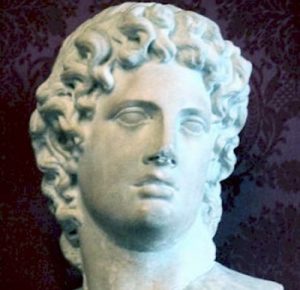Alcibiades the Athenian politician, orator and general
 Alcibiades, (450-404 BC), was a prominent Alcibiades Athenian politician, orator and general in Ancient Greece. He was the last known member of the aristocratic Alcmeonid family. He played an important role in the second half of the Peloponnesian War as a strategic advisor, military and political.
Alcibiades, (450-404 BC), was a prominent Alcibiades Athenian politician, orator and general in Ancient Greece. He was the last known member of the aristocratic Alcmeonid family. He played an important role in the second half of the Peloponnesian War as a strategic advisor, military and political.
In ancient Greece, Alcibiades was a famous person. Thucydides praises the Athenian politician for his political behavior and motives. According to the historian, Alcibiades, who was “too ambitious”, proposed the campaign in Sicily, in order to increase his wealth and fame thanks to his victory.
Alcibiades is not considered by Thucydides responsible for the destruction of Athens. Plutarch considers him as the least meticulous and the most careless of all human beings. Xenophon emphasizes Alcibiades’ service to the state, despite the harmful results it caused.Demosthenes defends Alcibiades’ effectiveness, saying he has taken up the arms in the cause of democracy, displaying his patriotism, not for money and speeches, but as a personal service.
During the Peloponnesian War, Alcibiades changed his political alliances several times. In his native Athens, he adopted at the beginning of the 410 BC. an aggressive foreign policy and was a staunch supporter of the campaign in Sicily, but left for Sparta when his political enemies accused him of sacrilege. In Sparta he served as a strategic adviser, proposing or overseeing major campaigns against Athens.
In Sparta, however, Alcibiades gained strong enemies, when he escaped to Persia. There he served as an adviser to satrap Tissaphernes, until the Athenians asked him to return. So he served as an Athenian general for several years, but his enemies managed to exile him a second time.
The campaign in Sicily was an idea of Alcibiades and some scholars claim that if Alcibiades had taken over the administration of the campaign and not Nikias, the campaign would not have been so catastrophic for the Athenians. In the years he served Sparta, Alcibiades played an important role in the destruction of Athens.
The occupation of Dhekelia and the uprisings of several strategic vassal cities took place either at his suggestion or under his command. When he returned to Athens, he played a key role in a series of Athenian victories, which forced Sparta to seek peace.
He adopted unconventional tactics, occupying cities often through betrayal or negotiation, rather than through siege. Alcibiades’s political and military talent proved to be useful to any state loyal to him, but the tendency to make powerful enemies meant that he could not stay in one place for long.
Alcibiades felt a strong attraction to Socrates, but his energy and ambition found a more natural outlet in politics. By 420 BC he was a leading politician, anti-Spartan and aggressive. In 415 he urged the conquest of Syracuse, the most powerful city in Sicily. Over the opposition of Nicias, his conservative opponent, Athens equipped a mighty expedition with Alcibiades, Nicias, and Lamachus in command.
Shortly after it reached Sicily, however, Alcibiades was recalled to stand trial on a charge of impiety. He fled to Sparta, and while the Syracusan expedition, deprived of his leadership, was ending disastrously, Alcibiades advised the Spartans on how best to wage war against Athens.
He changed sides again in 411. After considerable service to Athens, however, he fell under suspicion in 406, when a subordinate was responsible for a naval defeat off Notium.
One of ancient Greece’s most adventurous and controversial personalities, Alcibiades was a disciple of Socrates, and is one of the characters in Plato’s Symposium.
Extremely good-looking, very wealthy and always living according to local custom wherever he was: on horse in Thessaly, constantly drunk in Thrace or taking ice-cold baths in Sparta, he was subject to much gossip, admiration but also animosity.
As a general, he was sent to lead an expedition to Sicily where a Greek town needed help. On his way there, he was sent for by the Athenians, who wanted him to return immediately to face charges of vandalisation and sacrilege. On the night before his departure, almost all Hermes statues in Athens had been damaged and the Athenians suspected that Alcibiades and his party lay behind this after a drunken last night in town. Also, they had satirised the Eleusinian Mysteries, which was considered severe blasphemy.
When Alcibiades learnt of this, he fled to Sparta and offered the Spartans to help defeat Athens. The Athenians sentenced him to death in his absence, and all his property was confiscated by the state.
Because of problems with the Spartan leaders, Alcibiades was once again forced to flee. This time he went to the Persians, but soon managed to win back the confidence of the Athenians. They made him general again, and he won some important victories for Athens, amongst others he conquered the cities of Chalcedon and Byzantium.
This was not to last, though, because when his new expedition to Asia failed, the Athenians again became hostile towards him and Alcibiades fled to the Persians.
One night, his house was set on fire and when he ran outside he was killed by a gang of bowmen. Apparently, the Spartans had put pressure on the Persians to assassinate him.
